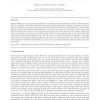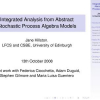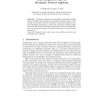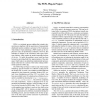132
click to vote
PE
2010
Springer
14 years 8 months ago
2010
Springer
Fluid modelling is a next-generation technique for analysing massive performance models. Passive cooperation is a popular cooperation mechanism frequently used by performance engi...
100
click to vote
DAGSTUHL
2006
15 years 3 months ago
2006
We present stochastic process algebra models of a Circadian clock mechanism used in many biological organisms to regulate time-based behaviour. We compare modelling techniques fro...
128
click to vote
EPEW
2008
Springer
15 years 3 months ago
2008
Springer
Currently compilers contain a large number of optimisations which are based on a set of heuristics that are not guaranteed to be effective to improve the performance metrics. In th...
125
click to vote
CMSB
2008
Springer
15 years 3 months ago
2008
Springer
Stochastic Process Algebra Models Jane Hillston. University of Edinburgh.
113
click to vote
EPEW
2006
Springer
15 years 4 months ago
2006
Springer
We present a stochastic process algebra including immediate actions, deadlock and termination, and explicit stochastic delays, in the setting of weak choice between immediate actio...
119
click to vote
EPEW
2006
Springer
15 years 5 months ago
2006
Springer
In this paper, we introduce FPS, a mechanism to define performance measures for stochastic process algebra models. FPS is a functional performance specification language which desc...
109
click to vote
ARTS
1999
Springer
15 years 6 months ago
1999
Springer
Stochastic process algebras such as PEPA provide ample support for the component-based construction of models. Tools compute the numerical solution of these models; however, the st...
116
click to vote
WOSP
2000
ACM
15 years 6 months ago
2000
ACM
Performance models are of increasing interest to professionals who do not have a background in mathematical analysis, it is important to provide additional mechanisms by developer...
108
click to vote
WOSP
2004
ACM
15 years 7 months ago
2004
ACM
This paper describes how soft performance bounds can be expressed for software systems using stochastic probes over stochastic process algebra models. These stochastic probes are ...
112
click to vote
QEST
2007
IEEE
15 years 8 months ago
2007
IEEE
We present a GUI-based tool supporting the stochastic process algebra PEPA with modules for performance evaluation through Markovian steady-state analysis, fluid flow analysis, ...




